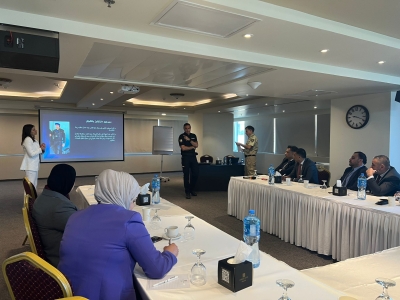News
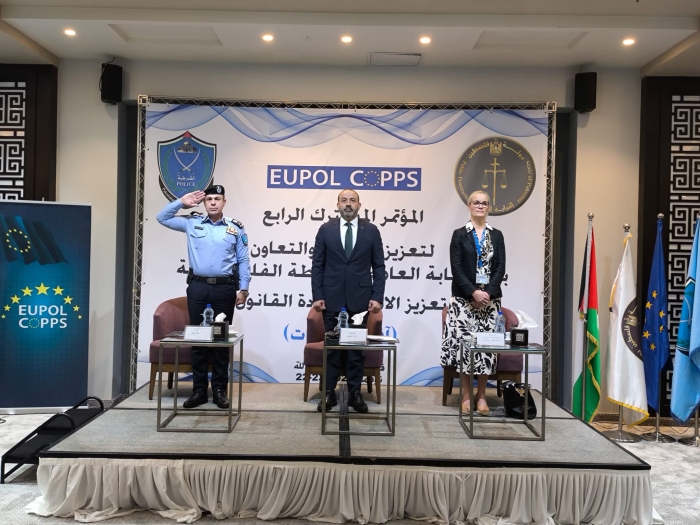
EUPOL COPPS supports Palestinian Police and Prosecution strengthen partnership
Cooperation between prosecution and police is essential for legally sound investigations and key for the effective functioning of the criminal justice chain. This is why EUPOL COPPS organised a two-day conference focusing on cooperation between Palestinian prosecution and police on 22 November, in Ramallah. The event was opened by EUPOL COPPS Head of Mission, Karin Limdal and attended with the Palestinian Attorney General Akram Al-Khatib, and the Chief of the Palestinian Civil Police, Major General Allam Al-Saqqa. Ms. Limdal stressed about the importance of strengthening coordination and cooperation among Palestinian police, prosecution, and the wider justice chain working as one system that delivers reliable services to Palestinian citizens. Topics discussed at the conference included the role of the International Criminal Police Organisation (INTERPOL) in cross-border investigations, prospects and challenges in collecting evidence in drug related crimes, the role of the department of evidence and forensic laboratories in improving investigations, the importance of cooperation on Cybercrime and the one of media in raising community awareness and its impact on the course of the investigation. On the occasion the Attorney General and Chief of Police signed an amended Memorandum of Understanding (MoU)on strengthening mechanism for cooperation in the criminal justice field. This revised MoU reflects a renewed commitment to strengthening cooperation, streamlining communication, and ensuring better coordination across all stages of criminal investigations and prosecutions.
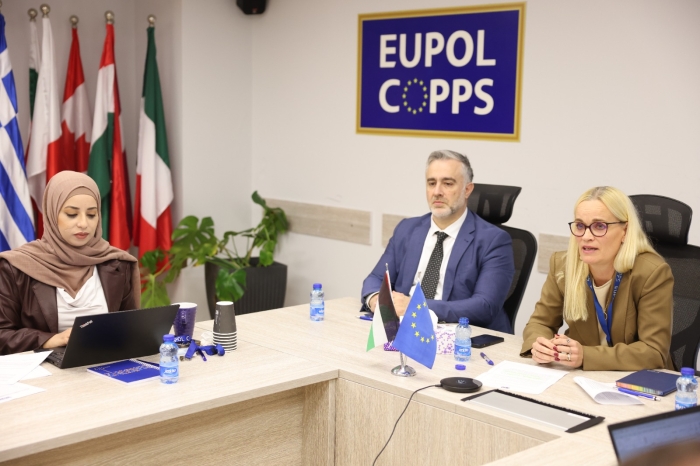
Men and boys contribution to peacebuilding: EUPOL COPPS celebrates International Men's
The Palestinian youth (18-29 years.) amount to 1.2 million in Palestine, out of which half are young men, making them a fundamental pillar in any future development or national crisis response. This and more were discussed at a roundtable titled “Supporting Men and Boys. Building Safer, Stronger Communities”, marking International Men’s Day 2025, at EUPOL COPPS headquarters, on 19 November, in Ramallah. The event addressed the importance of men and boys contributing to peacebuilding in Palestine and beyond, discussing topics including boys’ and men’s role in peace, security and justice, Community Policing as a trust-building tool and reframing youth engagement as a source of resilience rather than risk. The meeting brought together Palestinian representatives of Civil Society Organisations including “Reform” and “Sharek”, senior police officers from Community Policing and Media Administration and EUPOL COPPS staff members joined the discussions. The attendees talked about the importance of preventing violence and building trust by creating real connections between young people, local communities, and the law enforcement side. Asked about how young men in Palestine can play a more active role in advancing peace, security and justice through their engagement with the police and justice sector, a representative of the Palestinian Civil Police detailed on outreach and training at local community councils’ level, awareness campaigns for youth in schools and universities, including-on anti-narcotic and cyber crime. This is done mainly though social media. EUPOL COPPS’s Head of Mission, Karin Limdal, who opened the roundtable, asked some of the Mission’s staff to share their experience on how to tackle situations polarizing youth in their home countries. Examples from Spain were shared, highlighting situations influenced by unemployment, cybercrime and narcotics, and how the Spanish police engage in schools and universities. Another example from France focused on the issue of domestic violence. A rampant youth unemployment in the West Bank affects 38% of young men. Considering economic vulnerabilities, political instability and insecurity, discussing how can youth engagement help shift a polarized dynamic of mistrust to collaboration and shared responsibility between the State and its communities seemed of relevance on International Men’s Day. EUPOL COPPS is committed to support Palestinian people in the framework of the EU engagement for a two-state solution.
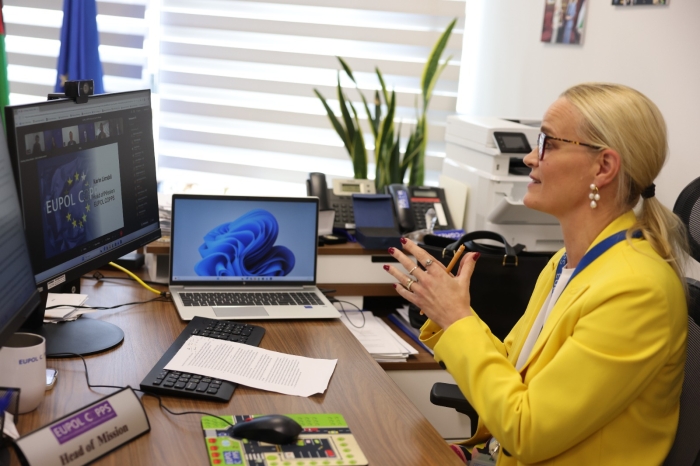
Working at EUPOL COPPS: What you need to know
As a civilian CSDP Mission, EUPOL COPPS’ primary role is to assist the Palestinian Authority in building its institutions for a future Palestinian state, focusing specifically on security and justice sector reforms. Ultimately the Mission’s objective is to improve the safety and security of the Palestinian people. By way of practical follow-up to the event, below you can find transparent and detailed answers to the most common questions about joining EUPOL COPPS in the field. The application process EUPOL COPPS relies on two main types of international staff, each with a distinct employment structure: Staff Type Contractual Relationship Remuneration Package Seconded Mission Member Contractual relation with their home government (sending institution). Assigned to the Mission for a specified period. Often retains their home government's salary and benefits. The Mission is unable to provide information on this package. Contracted Mission Member Contractual relation directly with EUPOL COPPS. Contracts are usually limited to the Mission’s mandate period. Receives a remuneration package directly from the Mission. To be seconded, individuals typically apply through their seconding authorities. A general recommendation for gaining information is to contact the Ministry of Foreign Affairs of your home country. You can learn more about the application process for a seconded position here. For an overview of recruitment and secondment process in EU Member States, visit this interactive map. EUPOL COPPS primarily recruits from EU Member States, but positions are also open to Third Contributing Countries (TCCs): Canada, Norway, and Türkiye. Note that recruiting a contracted Mission member from a TCC requires at least one seconded Mission member from that TCC to be already working in EUPOL COPPS. Recruitment requirements and timelines Age and Retirement: An age limit exists to ensure duty of care. Applicants should be able to serve the full period of a secondment (usually one year) or a contract (up to two years) prior to reaching the normal age of retirement in their respective states of citizenship. Importantly, positions are open to retired police service members provided they meet the required qualifications and experience and are within this age limit. Experience & Qualifications (Security Sector Reform/Legal): Security Sector Reform Positions: Require a university degree or equivalent professional police/military training, plus knowledge and practical experience in Security Sector Reform. Legal Positions: Typically demand several years of professional experience in the legal field (e.g., legal practice, international law, or judicial systems). Field Experience: While not always essential, field experience is highly valued as it indicates a candidate's ability to handle the demands of a Mission setting. Assessment Process: The process usually includes a selection interview with a panel. You may also be expected to complete additional assessment assignments to test skills and suitability, such as written tests, language tests, or practical presentation tasks involving case studies or situational analysis. Duration: The overall selection process usually takes about three to four months from application to deployment. The duration can vary depending on the volume of applications and the candidate’s engagement regime (seconded or contracted). Safety and Security The reality of serving in the field means acknowledging the complex security environment. First and foremost, Mission members are responsible for their own safety, as they would be anywhere else in the world. However, your safety is paramount, and the Mission has comprehensive systems in place: Proactive Intelligence: The Security and Health Department provides regular security advisories (via email and text messages) to help Mission members avoid being in the wrong place at the wrong time. This department is constantly in touch with local institutions and other sources of information to ensure you have the best intelligence. Specific Threat Procedures: There is a very specific procedure in place at Mission levels for taking shelter and ensuring protection. Upon arrival, you will be briefed thoroughly on how to face this type of threat. Emergency Planning: For extreme situations, EUPOL COPPS has protocols in place for emergency situations, including evacuations. Mission members are fully briefed on these protocols and provided with necessary contact information immediately upon arrival. Wellness and support on assignment The Mission recognises the mental and physical demands of working in a complex operational theatre. EUPOL COPPS provides various support services, including access to medical facilities through the Mission’s Medical Unit, counselling services, and recreational initiatives. The Mission generally offers a comprehensive health insurance scheme for its contracted staff, covering medical expenses, emergencies, dental, and vision care. Next steps EUPOL COPPS offers women a unique opportunity to contribute directly to peace, security, and justice sector reform in a challenging and rewarding environment. EUPOL COPPS seeks candidates who demonstrate a strong commitment to the Mission’s goals, ethical standards, and a willingness to work collaboratively. Attributes such as adaptability, resilience, and strong motivation are key to success. To find open roles, view the latest Calls for Contributions on the EUPOL COPPS website.
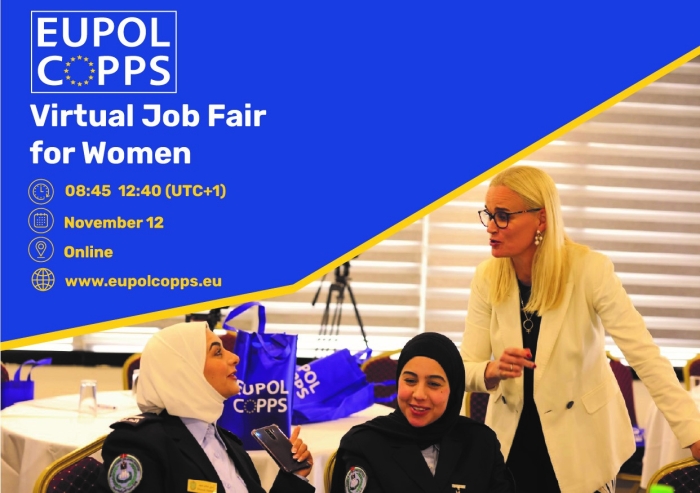
EUPOL COPPS' Virtual Job Fair: Career Opportunities for Women in Peace & Security
The fair is open to women with different professional profiles, interested in working in a civilian CSDP mission and in the fields of the rule of law, security, and peace building. During the virtual fair, there will be a direct exchange with EUPOL COPPS Mission members. Registered participants will have the opportunity to learn more about working conditions and daily mission life, application and selection process, and job possibilities for: police advisers, justice advisers; candidates with a legal or political background; candidates with an administrative, reporting or communication background; candidates with a finance, logistics, transport, IT or medical background; candidates with a public safety or security background. Register here by 11 November, 12:00 (CET) : https://lnkd.in/d7y77Y9g
One of Us
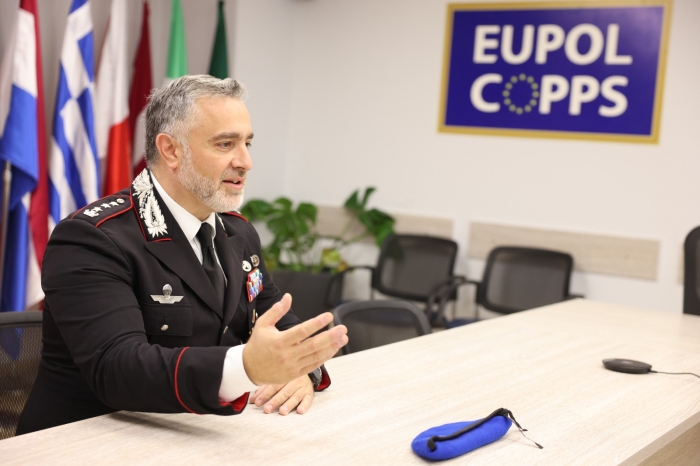
Roberto Arcieri – Head of Operations
In his early teens EUPOL COPPS Head of Operations, Roberto Arcieri, already envisaged he would wear a uniform as a grown-up. Being born in 1973 and raised in the ancient Grumo Appula, founded in Roman times and part of the Alta Murgia National Park in Southeastern Italy, Roberto grew up observing at close range the difference between good and bad, which translates into the State and its enemies. The organised crimes generally known as the mafia, was at the time active primarily in the South of the Italian peninsula, yet, moving its tentacles within transnational business and corruption. Exemplary Italian institutional figures like anti-mafia judges Rocco Chinnici, Giovanni Falcone, Paolo Borsellino, and Carabinieri officers like General Carlo Alberto Dalla Chiesa, Lt. Col. Russo, Cap. Basile paid with their lives their long-lasting fight on organised crime. They all died in the line of duty to defend the principles of legality, justice, freedom, equality, and dignity, by opposing the criminal power that threatens democracy. The ultimate sacrifice of some fellow Italians has been the game changer for Roberto, who picked the right side of the law joining the Italian Carabinieri (one of Italy’s primary law enforcement agencies, distinguished by their military status and broad range of responsibilities both domestically and internationally) at the age of 19. Being a Carabiniere has meant Roberto to be constantly on the move, either in his country, or abroad. “I was never in the same place for more than four years” says Roberto, who nevertheless managed to raise two children, now young adults, together with his wife. Roberto, who has the rank of Colonel, joined EUPOL COPPS last year, but he was not new to Palestine, as he was already here working for Carabinieri MIADIT (Missione Addestrativa Italiana) Mission in the framework on the US State Security Coordination (now Office of the Security Coordinator - OSC) coalition. Prior to that he has worked in various capacities, in different Italian regions fighting common and organized crimes, in international engagements in Bosnia Herzegovina, Eritrea, Kosovo, Afghanistan, Mali and also in Brussels, Belgium, focusing on African issues. As a EUPOL COPPS Head of Operations, leading colleagues working to support Palestinian justice and civilian security sectors, Roberto feels the experience changes him every day. The keyword in the Palestinian context is “flexibility” says Roberto, who strives to find solutions to the continuous challenges faced by the Palestinian counterparts the Mission is mandated to support, and for EUPOL COPPS itself. An approach certainly appropriate given the uncertainty facing Palestine and the wider region at this very moment.
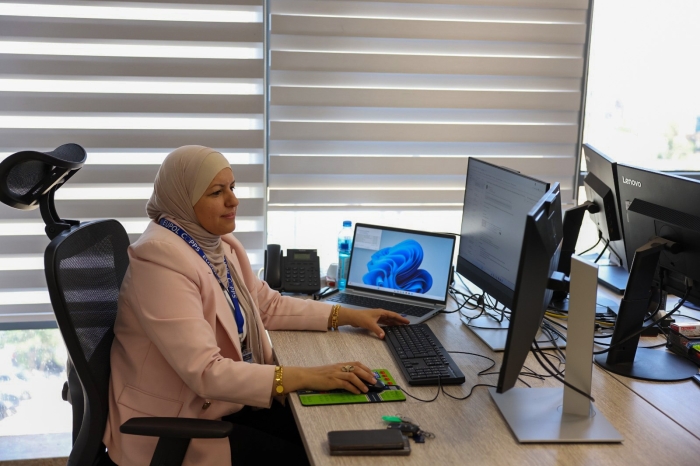
Khadija Aldeek
When EUPOL COPPS Financial Verification Officer, Khadija Aldeek from Palestine, sits down at her desk, she does not just see numbers on spreadsheets or invoices; she sees the foundation of trust that holds the entire mission together. At EUPOL COPPS, the Birzeit University accounting graduate reviews transactions to ensure they are in line with EU rules, related internal policy and international best practices. Having worked with international organisations and with major Palestinian companies, she brings international know-how together with local knowledge to her job. For Khadija financial verification is not a box-ticking exercise, but a necessary step towards accountability and transparency. She sees it not just as a rule to be followed, but as a safeguard—a way of making sure every euro is spent as it ought, of building trust, and of keeping the Mission's financial systems secure. In the seven months she's been working at EUPOL COPPS, she has made a real impact. Her influence extends beyond paperwork. She is a valued mentor to colleagues across departments, helping to clarify on procedures and best practices. "I don't merely point out mistakes, I also show how to prevent them," she says. "My goal is to enable others to do better when following EU financial rules." Her no-nonsense, calm approach has also made her a source of contact for employees who are struggling with money matters. She's made many see this work differently, transforming it from a chore into a chance for development and learning. "Done correctly, financial verification protects the entire organisation. It's not just about finding mistakes—it's a matter of trust-establishment, system-strengthening, and knowing that every decision is being made on the foundation of accurate, verified information," she says. With her integrity, professionalism, and enthusiasm, Khadija Aldeek isn't just implementing financial regulations—sews a culture of accountability and trust, one transaction at a time, says Khadija, a dedicated mother of three, balancing family and career with discipline and focus.
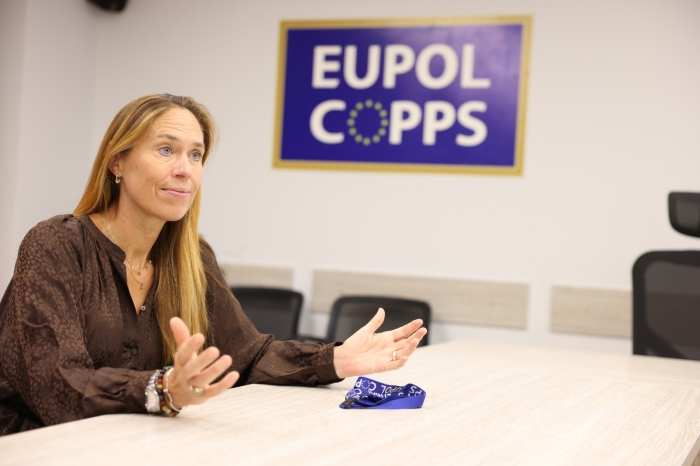
Maria Ek Odsjo
Our deputy Head of Justice Unit, Maria Ek Odsjo, is a senior judge in her mid-50s. In Sweden, where she comes from, she has for the last years extensively been working on asylum and security related cases, including dealing with individuals arriving from then ISIS ruled Syria and Iraq. The cases she was presented with, reached Maria through the criminal justice chain, having been dealt with by the Swedish police before arriving on her desk.. Her latest role in the Swedish justice system was to lead and manage the work of around 45 legal professionals. Each of them had cases to solve. Maria had the overall oversight and also, depending on the situation, the responsibility to approve asylum, . This has exposed Maria with a wide range of people coming from parts of the world she had never travelled to. In other words, she had the opportunity to get to know different cultures through human and professional interaction doing her job in Stockholm. Asked when and how the decision to be a judge appeared on her life horizon, Maria answers that this happened during her time as a young law clerk in a small town in her homeland. Having always been interested in society and political science, Maria initially chose law for her university studies with the initial attitude of “giving it a try”. She explains that she “very much liked both criminal and civilian proceedings, as well as social law”. Much later, as an experienced professional, Maria represented Sweden in Brussels, working at the Swedish Permanent EU Representation with law drafting. The choice to join EUPOL COPPS and come to Palestine is partly linked to her experience in dealing with many cases involving people from the Middle East.. “I wanted to experience the culture firsthand, meet the people, to see for myself what it looks like, to experience what it means to walk through Damascus Gate in the daylight and at night. Now that I can do it, I know what an amazing feeling it is to pass by this special place. This means something special to me and has taught me something essential about different life conditions. When Maria first joined the Mission, she was a Senior Justice Advisor advising her Palestinian colleagues on court proceeding related matters. She had the possibility to learn from her Palestinian colleagues and share her own experiences from her own professional career. Working in an international environment such as an EU Mission is also somehow life changing, indicates Maria. “In my current role, I strive to support my colleagues in solving challenges and problems, when these occur. With the counterparts I now see my role as a way of giving my contribution to advancing Rule of Law in Palestine”. Among the milestones carrying a personal touch during her career as a judge, Maria recalls the time she had a case of a Palestinian family coming from Iraq exposed to a very difficult situation where she contributed to them being granted asylum on the basis of the need for education of their young children aged 10 and 12. As every new experience in life produces a change in each of us, working in Palestine has made Maria, as she explains, a bit humbler as an individual, more understanding of difficult situations, having had the chance to see these firsthand. The realisation of having an EU-passport appearing “privileged” compared to others, for example Palestinians (many can’t even have one), is also a humbling experience, says Maria, who has observed what happens at border crossing points like the Allenby Bridge (border between Israel and Jordan, editor’s note), seeing the difference of procedures occurring according to the kind of documentation provided. “I now understand a lot more things about the people from the Middle East I met in my country” says Maria. When thinking about the time when she will be returning to Sweden, Maria believes her experience in Palestine will make her a better judge. Although, she said, I think I would prefer to have further experiences in CSDP Missions after Palestine before returning to be a judge in my country. She has pinned Ukraine on the map, where a sister EU Civilian CSDP is deployed, however that will have to wait as there still so much to do here to support Palestine.

“I want to be one of them”, said 4-year-old Anu pointing at a police car
Looking out of the window at her grandparents’ house in the town of Pori, Finland, Anu Aro, asked her grandma what that was pointing the finger at a police car. “I want to be one of them”, said the then 4 years old Anu. It was the winter of 1974. By the age of 23, after having spent a sabbatical in Cyprus (1989-1990) working as au pair, Anu joined the Finnish Police, getting first a Diploma in Police Studies, then a Bachelor in Police Command Examination, and a master’s degree in Social science studies from Universities in Finland. Whilst working and studying, Anu had 3 daughters, now age 30, 28 and 22. At present, while deployed as a Finnish secondee at EUPOL COPPS as Senior Police Advisor in Training, Anu is about to finish another master’s degree in security and risk management criminology at the University of Leicester, in the UK. EUPOL COPPS is not the first international mission for Anu, as she consecutively worked in international missions as of 2104. She served in Afghanistan (EU and GIZ/German cooperation), Liberia (United Nations) and Somalia (EUCAP Somalia). Asked “why” EUPOL COPPS at this stage of her personal and professional path, Anu recalls that this very Mission was the first she ever applied for in 2012. “I was the second-best candidate” says Anu, explaining that she opted for Afghanistan, to later discovered later that the selected competitor for Palestine did not go in the end. Therefore, when recently a possibility materialised to join EUPOL COPPS it felt for Anu like closing a circle, so she applied for the position she now covers, explains Anu. Another reason for joining EUPOL COPPS, continues Anu, is the fact that she is “a person constantly working on self-development and self-education, passionate about history”, always eager to see with her own eyes about the situation on the ground in Palestine, which she read about for long time. When discussing about the challenges that a woman, a mother, can face about the choice of joining a Mission, Anu says: ‘When I went to my first Mission my youngest daughter was 12. It was possible for me to go to know everything was fine at home, as I had a good agreement with her father. Anu reveals that at time she felt criticized by some of her male colleagues in the Finnish police for her choice to go leave her children to go to Missions . “The advice I would give to women willing to be deployed in Missions is to ignore other people’s opinion. Of course you change your life, so you might lose some friends because there is less time to spend together”. Anu underlines the importance of the quality of time she had and has with her daughters when serving in Missions, like going on holiday together. She also recalls hard moments as several times she fond herself under attack in Afghanistan, having to spend up to 16 hours in a bunker, with all the consequential difficulties in communication with her family. “I always called my daughters from the bunker where I sheltered with my colleagues to reassure them. I have always tried to inform them about everything because things go so fast to the news nowadays and I want them to get the first information from me instead of reading it from the internet”. Talking about her daily work at EUPOL COPPS Anu explains that she finds out about what kind of trainings are needed by the Palestinian Civil Police, focusing also on Gender mainstreaming. She tries and find out for example why women do not attend certain training activities and what should be done about it. “Nowadays Palestinians are willing to send their daughters to train as police officers, also as a source of income for the family, but at the same time there are worried about their safety”. Anu recognises that her long-term experience in many crisis areas makes her “a very different person than before”. “I see the difference between me and people that have had similar life and professional experiences and the ones back home that have not” says Anu. “For example, at home people debate about politically correct wording of things, or topics that looked at from other parts of the world frankly look irrelevant”. The woman who aged 4 knew she would wear a police uniform, concludes: “my observation is that in wealthy countries people easily see small things as a problem, unlike in places where people have worries about bringing food on the table and have to walk long hours for water or to reach the workplace”.]
Follow us on Social Media






Videos
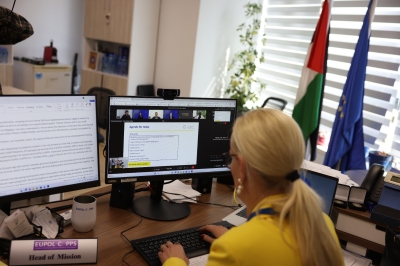
Women’s participation in EU Civilian Crisis Management Missions is vital for inclusive and sustainable peace
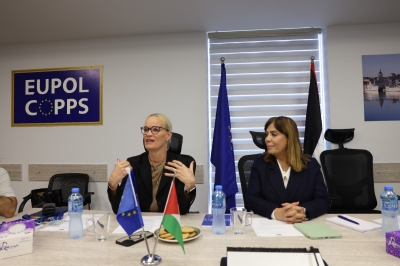
Today marks 25 years since the adoption of UNSCR 1325 on Women, Peace and Security
